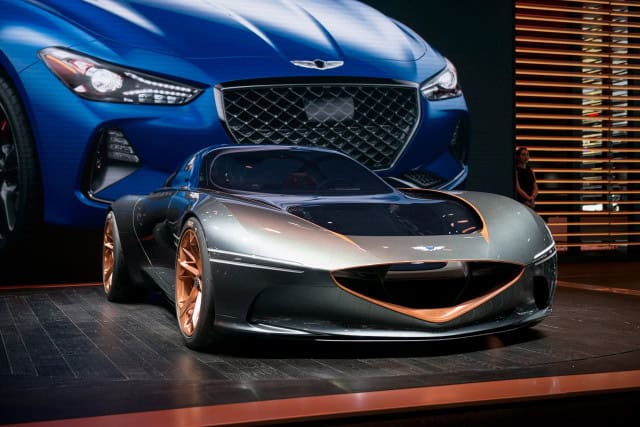
As solar cells get more efficient, powerful panels can fit on smaller areas. For those looking to use renewable energy for transportation, that means solar panels can now move from home rooftops used to power car chargers to cars themselves.
In Korea on Wednesday, Hyundai and Kia revealed some production-bound examples of that concept—including a solar roof that can boost vehicle efficiency no matter what type of propulsion is on board.
Hyundai aims to roll out the technology in three different generations, starting in 2019. The first generation will be offered on its hybrid models, such as the Sonata Hybrid and Ioniq. It adds silicon solar panels integrated into the roof. According to Hyundai it can charge up to 60 percent of the hybrid battery (1.56 kilowatt-hours in the Ioniq) over the course of a day.
The second generation of the technology is claimed to be the world’s first solar-charging technology for internal combustion engine vehicles, taking the load off the alternator to charge the 12-volt battery. It’s also compatible with full hybrid and battery electric powertrains and helps increase fuel economy and range. In the form of a semi-transparent roof, it’s easily integrated into existing panoramic sunroof designs.
A third-generation system adds solar cells to the hood and roof of the vehicle and will help maximize the range of the drive battery in fully electric vehicles.
It’s a little convoluted, of course. Very few vehicles would be able to harness the peak power from a panel (Hyundai gives 100 watts as an example) for much of any day, because of the need to be out in the direct sunlight, with it shining on the cells at the proper angle. But the company claims that a Maximum Power Point Tracking (MPPT) system helps increase the efficiency by controlling voltage and current. Doesn’t every mile count?
Hyundai says that adding solar is just one possible implementation as vehicle owners move from being energy users to energy producers (with additional products like home solar, for example).
This first-generation solar roof will be introduced to Hyundai Motor Group vehicles—which could include Hyundai, Kia, and the company’s new luxury brand, Genesis—starting in 2019.
Toyota has opted not to offer U.S. Prius Prime buyers the solar-roof option that’s available in Japan at an optional cost of approximately $2,500. According to Toyota that system will recover an average daily range of 1.8 additional miles if parked in direct sunlight.
Few other vehicles have offered recharging of the traction battery, although several vehicles, including the Nissan Leaf, have offered smaller solar systems that can power auxiliary systems or a climate fan.
Hyundai and Kia spokespeople contacted by Green Car Reports said they could not comment yet about how this technology might be deployed in the U.S.
Such tech could very well show up as a badge of “eco cred” to be worn by an upcoming Genesis electric flagship coupe, due around 2020—where solar cells could make luxury-car consumption a little less conspicuous, perhaps.
